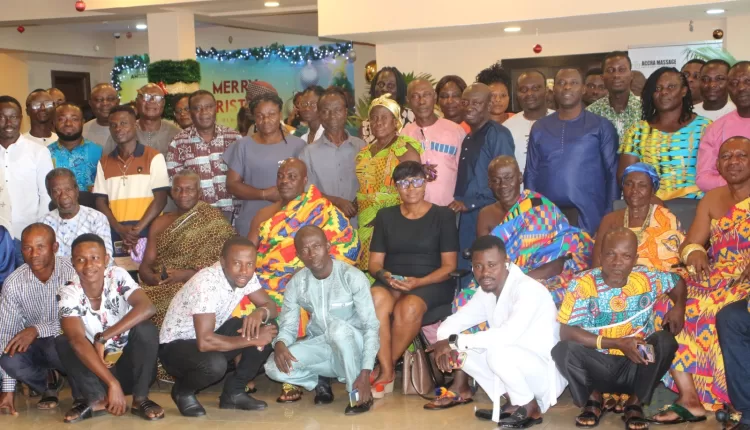Civil society, non-governmental organisations, and government institutions mandated to seek the welfare of cocoa farmers in the country have renewed their commitment to fighting against activities linked to child labour within the value chain.
The eagerness to fight the menace in the country is in fulfilment of Sustainable Development Goal (SDG) target 8.7, which aims to eliminate the worst forms of child labour, including the recruitment and use of child soldiers, as well as to end all forms of child labour by 2025.
In this light, Rainforest Alliance has hosted a national dialogue on Tackling Forced and Child Labour in the Ghanaian cocoa and gold mining sectors under the theme “Ending child and forced labour by 2025: How far have government, companies, and communities translated commitments into impactful action?”
Key stakeholders, made up of chiefs, cocoa companies, representatives of cocoa cooperatives, and gold mining associations, among others, acknowledged the existing gap causing the recorded cases of child labour while pledging commitment to form a unified body to transform the livelihood of cocoa farmers to meet the SDG target.
Senior Project Manager for Forced and Child Labour at Rainforest Alliance, Joyce Poku-Marboah, said the project “Tackling Forced and Child Labour in Ghanaian Cocoa and Gold Mining” over the last two years has invested in capacity training of some 212 individuals, including females, on child and forced labour concepts to create awareness.
The project, she said, also organised annual stakeholder review meetings, harmonised indicators and data collection instruments for the Ghana Child Labour Monitoring System (GCLMS), and strengthened the toll-free helpline in the hope of increasing awareness of child labour in cocoa-producing districts and regions.
Supported by the Norwegian Agency for Development Cooperation (NORAD), the International Cocoa Initiative (ICI), and Solidaridad, the project is said to have executed a multi-sectoral approach that has seen an increase in socio-economic resilience and protection against forced labour.
“Inasmuch as there is more work to be done to eradicate this menace, we also acknowledge the fact that some level of remarkable work and resources have been invested into transforming the livelihood of farmers in attaining SDG target 8.7, which is worth commending,” added Poku-Marboah.
“Cocoa companies, traders, cooperatives, and farmer groups have, on their part, implemented measures to prevent, identify, and address forced labour in the cocoa supply chain in Ghana,” she observed.
The Deputy Director of Monitoring and Evaluation Research at Ghana Cocoa Board, Paul Ntim, assured the commitment of Cocobod to strengthening partnerships with stakeholders within the cocoa value chain in the fight against eradicating child labour incidents in the country.
“Cocobod has an outstanding relationship with stakeholders in the effort to fight child labour. The issue of child labour has remained a global concern for over two decades, and Cocobod has ensured that unacceptable labour practices are eliminated from our cocoa value chain.”
He lamented the recent documentary on cocoa child labour in some parts of the cocoa belt, which featured children allegedly being forced into cocoa farming.
Ntim described the documentary as “stage-managed propaganda” aimed at sabotaging the progress made by Cocobod.
“The propaganda and stage-managed reported cases of child labour are negatively affecting the country.
He said Ghana Cocoa Board has taken notice of and is concerned about the rising incidence of stage-managed child labour reports by some international media outlets, including recently Aljazeera.
“We are making it known that some of this stage-managed propaganda about child labour incidence reports in the cocoa landscape can undermine Cocobod’s collaborative efforts with international partners,” he warned.
Principal Officer, Gender and International Affairs, Minerals Commission, Monalyn Anokye-Bempah, indicated that the commission has also held a sensitization programme that involved chiefs, opinion leaders, farmers, and other resource persons to eliminate child labour in the mining communities.
She said over 300 women have been trained in bead making and other vocational training programmes in communities such as Nsusiaden, Bob Krom Entuwuada, and other catchment communities in the Western Region.
“We are also embarking on training women in the Eastern region on palm oil production to empower mothers to take good care of their children. This initiative has been curated to eradicate child labour,” she added.
- Resource Media to Project Ghana’s Progress on Child Labour - March 11, 2024
- Ghana Startups to Get Direct Cocoa Beans Supply This Year - February 2, 2024
- How SOCODEVI is Helping Bridge Gender Gaps in Cocoa Communities - February 1, 2024
